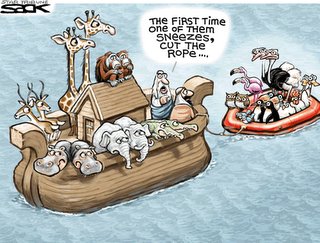Vallankumouksellisia mietteita...
Presidentinvaalit Yhdysvalloissa ovat mieletonta manipulaatiota, imagon rakentamista ja valehtelua. On kyse niin suuresta vallasta ja vallankaytosta, etta siita ei hevin luovuta, eika sita jaeta aivan 'demokraattisesti', niin kuin ehka olettaisimme talta demokratian kehdolta. Seurasin viime vaaleja sydan syrjalla, silla Bushin kaudella raaka valta ja vallanhimo olivat kuohuneet yli ja rajoja ei ollut nakyvissa. Saataisiinko demokratia pelastettua, ennen kuin Orwellin 1984 kauhukuvat tulisivat ajankohtaisiksi?
Howard Deanin vaalikampanja yllatti ja saikahdytti seka vallanpitajat, etta median. Mutta Deanin voitto oli ajatuksena aivan mahdoton: ulkopuolinen, suorapuheinen, 'populisti' poliitikko, joka vastusti Irakin sotaa rohkeasti ja vaati terveydenhoitoa koko kansan ulottuville. Dean oli ammatiltaan laakari ja pragmaattinen Vermontin kuvernoori, joka ei kumarrellut oikealle eika vasemmalle.
Tiedamme kaikki, miten 2004 vaaleissa kavi. Olin syvasti pettynyt demokraatteihin, mutta ymmarsin myos, etta kansa oli peloteltu aivan hermoheikoksi viimeisen muutaman vuoden aikana. Bushin hallitus oli manipuloinut kansan terrorismin pelkoa niin taitavasti, etta lopulta turvallisuuden tarve voitti. On myos muistettava, etta vain vahan yli 50 prosenttia kansasta aanesti. Se on alhainen luku demokratiassa. Suomessa ollaan kai 80 prosentin tuntumassa...
The Dean Revolution
You see, the revolutionary idea behind Howard Dean’s campaign was not the use of the Internet. It was not his lonely opposition to the war in Iraq. The revolutionary idea of this campaign was that 600,000 people could rise up in the blink of an eye, and in a matter of months they could change the political landscape. In a matter of months they could do more than power a long-shot presidential campaign. They could begin the difficult task of restoring fairness to our political system. They could matter again.
1
During the 2000 presidential election I was watching it all on a couch in Massachusetts. I stayed awake most of the election night because the results were not clear: was it going to be Al Gore or George W. Bush? As the vote-count went on I began to have a sinking feeling that the Democrats had lost. I had thought that – for the most part - the Clinton-era had been hopeful, upbeat and good for the country. People had good jobs and their wages were on the rise; the environment, education and health care were national priorities. Sure, there were problems; America is a large nation with big challenges, but we were working on those issues. Although Bill Clinton had made us weary of scandals with his personal problems, he had been successful as President on many fronts. Surely people would see that it was a good idea to keep a Democrat in the White House.
As it turned out, Al Gore lost the election (with some help from the Supreme Court, no less), so it was time to begin to adjust to a new way of thinking. Being a pragmatist and an optimist by nature, I thought that maybe it wouldn’t be so bad for a Republican to run things for a change. Change is good, right? Let’s give George W. Bush a chance. He is a “compassionate conservative” after all.
But George W. Bush was no ordinary Republican. He was different from his father, George H.W. Bush; he was different from Ronald Reagan, whom I blame for many of the problems now plaguing the nation, but who at least knew his limits. George W. Bush seemed to run the country in complete disregard of the working man, the middle class, or the poor. He was way too comfortable with the lobbyists, the super-rich and the ultra-religious. He seemed to despise the rest of the world and consider other nations evil or just not worth his time and effort. One of the first things he did as President was to pull the United States out of the Kyoto Protocol in the spring of 2001. Then he cut taxes for the wealthy and wasted the government surplus. (He began to spend money and hasn’t stopped yet.) There were so many incidents that showed the President’s lack of commitment to ordinary Americans, or to the world, that I lost count. I was breathless by 2002, and ready for a change. But Mr. Bush was not finished…
As the Bush administration began to make its case for war to depose Saddam Hussein I knew deep down in my guts, that the decision had already been made: the United States would wage war on Iraq. This was the last straw on my camel. No Western, democratic nation, who respected the rule of law, had ever attacked another sovereign nation without provocation. It was an outrage! I went out with thousands of others in Seattle – and millions around the world – to protest in the streets: no war in our name! Surely the administration could not ignore all of these people across the world. Surely George W. Bush must give pause and consider these powerful expressions of opinion! But my gut feeling came true. The United States and the “Coalition of the Willing” attacked Iraq in March 2003 with bombs and air raids and tanks. I watched in horror as the cradle of civilization was getting pummeled to the ground and priceless artifacts were looted from museums and archeological sites, or just destroyed by bombs. Thousands of civilians died and we didn’t even count them; they were simply “collateral damage”.
In 2003 nobody in America seemed to speak out against the war. (There were a few notable exceptions, such as Senator Robert Byrd.) Everyone was still shell-shocked by the September 11th tragedies and did not want to appear un-patriotic by opposing the war. A large majority in Congress had supported the war resolution in the fall of 2002; the emerging presidential candidates for 2004 appeared weak with regard to the Iraq war, and George W. Bush seemed invincible. There was one exception: Howard Dean. He articulated clearly his opposition to the war and to President Bush’s tax cuts and his other policies that were, in my mind, unjust and unfair to the majority of Americans. Howard Dean spoke boldly and plainly.
I went to see him speak when he came to Seattle in August 2003. I was convinced by then, that Howard Dean would make a good President, and I was willing to go the extra mile to support his candidacy. I had never given money to a political candidate before (having grown up in Europe it was distasteful for me to give money to politics – the government ought to support such an important election.) I donated money and started to go to Howard Dean meet-ups. That fall was an exciting time. Dean began to surge in the polls and people seemed excited and concerned about the need for change in the nation’s politics.
Joe Trippi’s book
This Revolution Will Not Be Televised is an interesting look into the Howard Dean presidential campaign. It brings me back to my own experience in the autumn of 2003. Trippi talks about the hopelessness that decades of TV-driven politics had instilled in people; but he also talks about the energy and the power of the grass-roots movement that the Dean-campaign generated. I experienced both.
Joe Trippi is a passionate political junkie, who can’t get enough of political campaigns and working for the underdog. He writes the book in a gritty, and sometimes cocky fashion, but his sincerity is evident. He grew up poor and learned that social justice and democracy were values worthy of pursuing. Progressive politics is his bread and butter, and his first love.
Mr. Trippi blames television for the demise of American culture, politics and public life. TV has created apathy, cynicism and powerlessness among its audience – which is just about everyone in America. It has created a consumer-oriented society with little interest in democracy or civic engagement.
In the last half of the twentieth century, television staged a hostile takeover of American culture, in just twenty years going from reflecting American life, to altering American life to dictating nearly every aspect of American life: the products we buy, the clothes we wear, the things we fear.P
olitics didn’t escape the onslaught of TV. In some ways, it was one of TV’s first conquests. 1
In
Breaking Up America Joseph Turow calls the negative effects of commercial television the breaking up and segmenting of America. “Their [advertisers] vision is of a fractured population of self-indulgent, frenetic, and suspicious individuals who increasingly reach out only to people like themselves."
2 Politics has become just another commodity to be advertised, bought and sold.
TV has been very effective in characterizing a candidate’s political opponent in a negative light. According to Joe Trippi, because of negative ads attacking each political candidate in a presidential election (or any other high profile, big money spending race), Americans end up hating both candidates so much they wish they had a third person to vote for. Television viewing makes people passive, but they do remember who the ‘bad guys’ are, after being told a hundred times by simplistic and narrow (often out of context) television ads. Mr. Trippi is guilty of doing the same thing to his opponents: painting them with negative propaganda. But he realizes that modern broadcast politics is the death of democracy. Television’s iron grip on American culture began the “downward cycle” of U.S. politics “because the most effective ads are the ones that make the community a worse place to live… The best ads – deceitful, negative, and manipulative – are the ones that fail the country most”.
1
Another negative aspect of modern presidential politics is money. Joe Trippi estimates that 1.6 billion dollars would be spent on TV ads during the elections of 2004. That is an incredible amount of money! Even though I don’t believe in sending money to political candidates, I felt that I had no choice, knowing that George W. Bush would have two hundred million dollars to spend on his campaign. Who could even begin to challenge that kind of money? Trippi describes in his book how the Howard Dean campaign raised money through the Internet. The average donation was about a hundred dollars (compare that to the thousands Bush loyalists raised from the wealthy elites and the corporations). It was people like me who sent money to the Dean campaign. People who didn’t have a lot of extra cash to spare, but they cared about what was happening to the country.
I cannot begin to explain how disgusted I am by the legal corruption going on in the United States government. I didn’t believe it at first when I began to follow U.S. politics. Corruption only happens in the poor developing countries, right? But the last five years have been such blatant money-grabbing, greed-rewarding, in-your-face politics, that I’ve had to re-align my beliefs. Again, it all starts with the TV ads. Politicians need lots of money to run ads to get elected. Large corporations and wealthy individuals have money to spare. Add these two together and you get a very cozy relationship between power and money. According to Trippi both political parties and most candidates are for sale due to the system’s inherent demand for money.
Howard Dean was an outsider. He refused to be boxed in and defined by the Democratic Party or by the Republican Party. He also defied the media establishment by succeeding without playing the media game: he didn’t spend gobs of money for television, he wasn’t flashy and he didn’t say all the ‘right things’ to fit a Democrat mould for the media to categorize him with. He came from an “insignificant” state, Vermont, where nothing significant happens and where nobody is from. Howard Dean seemed very real (which meant unpredictable to the mainstream media) which appealed to me, as I’d seen so many fakes come and go. He spoke like a European with his pragmatism and honesty. He talked about the need for health care for everyone, and he talked about the Iraq war as a mistake and a diversion from doing the hard work of diplomacy and leadership. And he trusted the people. He was running an insurgency campaign letting his supporters make the important decisions in the campaign.
The ‘revolution’ of the Dean campaign was in the fact that it was the people, who had made Dean surge. Not money or the political establishment. And, according to Trippi, it was the Internet that made it all possible. Internet brings democracy back to the people, it makes people active again and empowers them. Unlike television viewing, the Internet enables people to give feedback to their leaders and to each other, to connect and to debate the issues. Joe Trippi was not managing the campaign, [people] “…were managing the campaign. It wasn’t headquartered in Burlington; it was out there. Anything we could do, they could do better".
1The Dean campaign began to use the Meetup.com website to allow people to get together in small (and large) groups all over the country. “… it was exactly the democratic vision of the Internet that I had always believed in, using this technology as a way for people of similar interests, passions, and causes to find each other and instantly form into communities…”.
1Joe Trippi’s long-standing enthusiasm of technology and all things geeky, emboldened him to take the first serious step into Internet-campaigning. He had a long-held belief that an issue or a cause could spread like a virus, by having a key group of people run with it. But before the ubiquitous nature of personal computers and access to the Internet, it could not be done efficiently on a national level. In 2004 it created a movement. The key people, by Trippi’s account, were those who weren’t afraid of change, who tended to distrust the mass media, and who were younger (perhaps more comfortable with computers). They also had a whiff of rebellion in them – they weren’t afraid to question the status quo.
The movement wasn’t quite strong enough in 2004 to create lasting change, but it was close. It scared the establishment. Howard Dean was slaughtered by the mainstream media. His "scream" was heard hundreds of times over and over. I felt demoralized and empty. That was it? Is that all we can muster? We were so easily defeated, it seemed. How foolish of us to believe that things could change, that we could actually have a say in a 'democracy'. But a seed was planted, and it will grow...
The established elites were not ready to give up their privilege and power to the people – and they will never be ready – but they had to fight harder to maintain their rule. Will the next election cycle be determined by an active populace who will demand their democracy back? Will there be enough informed citizens, who will not allow the elites to frame the issues, but will find out for themselves? Are we going to be intimidated by more negative or frightening TV advertising, or are we going to be able to see through the ads? Joe Trippi believes that we are ready for real change: “Together, I believe we can accomplish anything, if we just keep one idea in mind. One principle. Four simple words that still echo across America: You Have the Power”.
1
1. Trippi, Joe, 2004.
This Revolution Will Not Be Televised. Harper-Collins Publishers, Inc. New York, NY.
2. Turow, Joseph, 1997.
Breaking Up America. The University of Chicago Press, Chicago, Ltd., London













